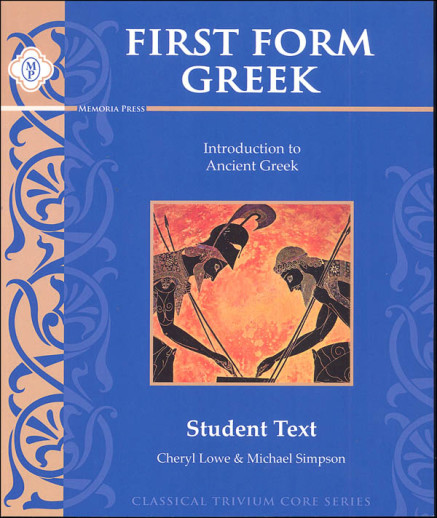Memoria Press is well known for their systematic First Form Latin series, and now you can learn Greek using their method as well. It will be helpful for students to already know the Greek alphabet, but if this is not the case, they can spend some extra time on lesson 1. The publisher also recommends that students have at least 2 years of Latin grammar. If your student meets these pre-requisites, they can start First Form Greek (FFG) as early as 6th grade. Greek is harder than Latin, so having this background will be quite helpful. The parent/teacher, however, is not expected to know Greek to teach this course. Be patient and let the workbook guide your lesson; they have done the work for you. Drilling is necessary. Think of it as practicing your swing in baseball. You do it over and over until it becomes a natural movement for you. Let's look at the components of this program.
The Student Workbook is your main resource for instruction. Each lesson is organized on facing pages and includes a Greek saying, a set of grammar forms, vocabulary exercises, grammar lessons, and elementary syntax. It has approximately 7-8 pages of exercises per lesson, which guide the student and teacher through the material. Expect a lot of drill activity. There are 5 units, each with 5 lessons and a unit review. The consumable workbook has 280 pages, but is not reproducible. The Teacher Manual (118 pgs, pb) has reduced student pages with directions for teachers in the margins. In the front are lesson overviews for instructors explaining the various parts of the lessons and how to help your student through them. This part is not that long and easy to read; don't worry. The Student Text will be referred to in your workbook lessons. It is also where you will spend time learning the alphabet if this is new to you. It is mostly grammar with some interesting cultural nuggets scattered throughout. It is a smaller format book at 7.5"x 9", (116 pgs, pb) and has useful reference pages in the back with English grammar, prayers, conversational Greek, a vocabulary index and more. The Quizzes & Tests book is consumable and may not be reproduced. So, like the workbook, each individual student should have their own copy. There is one quiz per lesson and a comprehensive unit test after every 5 lessons. Everything is fill-in-the-blank. Pages are perforated. Your spiral-bound, softcover Teacher Key has all answers for both the student workbook and the quizzes & test book. DO NOT LOSE THIS BOOK! There are about 200 Flashcards in this deck measuring 2.5"x 3.5". They cover things like vocabulary words, sayings, and grammar forms. You see the word written in our alphabet and the Greek alphabet on one side, and the English translation on the back with the part of speech indicated very small in the corner. The Instructional DVD set has 5 discs, with 8 total hours of instruction. Each lecture takes about 10-20 minutes per lesson. There are also oral drills (again with the drills!) and some on-screen examples & charts. The instructor is Elizabeth Pierce. Lesson instruction is now available streamed online as well. The Pronunciation CD is something you will use with all 26 lessons (unless you are fluent in Greek yourself) that include all of the vocabulary, sayings, and grammar forms for each lesson. You will be glad you have it. FFGTXT: Text, Workbook, Quizzes/Tests, Teacher Key, Teacher Manual, CD. FFGCMP: Text, Workbook, Quizzes/Tests, Teacher Key, Teacher Manual, CD, Flashcards, DVD.
Here is what the authors recommend for scope and sequence of FFG. Year 1: The Greek Alphabet Book & Key (to be done at the same time as Second Form Latin.) Items 050531 & 050532. Year 2: Begin memorizing the Greek grammar, some introductory syntax, and about 130 vocabulary words using FFG. Years 3-4: Complete the Greek grammar and continue building vocabulary via A Primer of Biblical Greek by Croy. Years 5+: Greek literature: the Septuagint and New Testament, Homer, Xenophon, etc.
After finishing FFG, the student will have mastered the 6 indicative active tenses of the omega verb, present tense of the to be verb, 2 noun declensions, 1st & 2nd declension adjectives, personal & demonstrative pronouns, and approximately 130 Greek vocabulary words. ~ Sara


